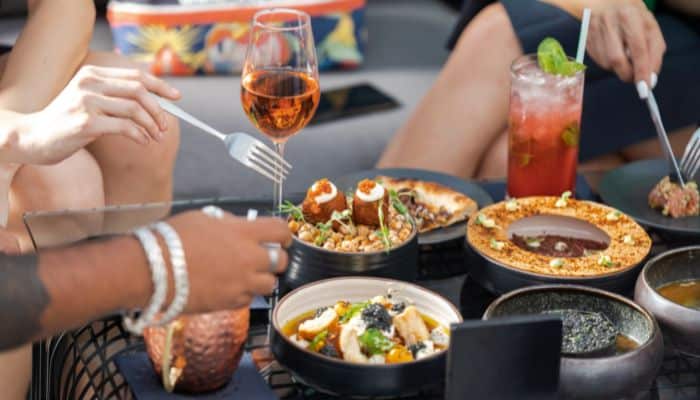Serving Sustainability: Your Guide to Acquiring FSC Certification for Your Restaurant
As we witness the global shift toward environmental consciousness, sustainability has become more than just a buzzword – it’s a way of life. Restaurants, in particular, play a pivotal role in this transformation.
One of the most impactful steps you can take to make your restaurant more environmentally friendly is by acquiring FSC certification.
What is FSC Certification?
The Forest Stewardship Council (FSC) is a globally recognized organization that promotes responsible forest management and using sustainably sourced wood and paper products. While this certification is commonly associated with the forest industry, it extends beyond that to cover businesses that utilize wood and paper products in various applications.
For restaurants, FSC certification focuses on using sustainable materials in products like furniture and packaging. North America has 61.05 million hectares of certified forest, making it the largest in the world. Restaurants can contribute to sustainability by sourcing materials from these forests.
Today, 12% of the world’s forests are FSC-certified. Earning FSC certification demonstrates your commitment to the environment, ethical sourcing and responsible consumption. It symbolizes your dedication to making eco-conscious choices in your restaurant’s operations.
There are three different types of FSC labels:
- FSC 100%: This label indicates that a product is made entirely from FSC-certified materials.
- FSC mix: Products with the FSC mix label contain a mixture of FSC-certified material, recycled content and/or controlled wood. This label is used for products that may not be entirely FSC-certified but still meet specific sustainability criteria.
- FSC recycled: This label is applied to products made entirely from reclaimed or post-consumer recycled materials.
How Restaurants Can Earn FSC Certification
Earning FSC certification for your restaurant may seem like a complex process, but with the right approach, it’s achievable. Here’s a step-by-step guide to help you get started:
Assessment of Your Current Practices
Begin by assessing your current practices and identifying areas to make sustainable improvements. Consider your use of wood and paper products, like menus, disposable utensils, furniture and packaging.
Identify Sustainable Suppliers
Work with suppliers who offer FSC-certified products and materials. Ensure they provide documentation proving the certification of the items they provide to your restaurant.
Documentation
Keep meticulous records of your purchases and transactions involving FSC-certified products. This documentation will be crucial during the certification process.
Submit Your Application
Contact an FSC-accredited certification body and request an application. Fill out the application form, providing detailed information about your restaurant’s operations and your commitment to sustainability. Submit the completed form along with any required files.
Complete an FSC Check
The certification body will review your application and conduct an initial check. During this check, they’ll verify the information you provided and assess your readiness for certification. Be prepared to provide any additional documentation or clarification if needed.
Approval
If your restaurant meets the criteria, you’ll receive approval for FSC certification. This approval signifies you’re on the path to becoming a certified sustainable establishment.
Annual Audit
After approval, your restaurant will be subject to annual audits conducted by the certification body to ensure ongoing compliance with FSC standards. Your practices and records will be reviewed during these audits to confirm you meet the necessary criteria.
Promotion
Once certified, you can proudly display the FSC logo in your restaurant and on your promotional materials. Use this as an opportunity to educate your customers about your commitment to sustainability.
Restaurants Committed to Sustainability
Numerous restaurants are FSC-certified, and others are on their way there by making small but significant changes and setting goals to reduce waste and manufacture products from recycled materials. Popular fast-food chains and Michelin-star establishments alike are committing to reducing their negative environmental impact. Here are some FSC-certified restaurants:
Amaz in Peru
The Amaz Restaurant in Lima, Peru, became the world’s first FSC-certified restaurant. In 2017, they received their certification due to their dedication to using ethically sourced wood products in their design and ensuring 80% of their ingredients are sourced directly from the Amazon.
McDonald’s
The world’s largest restaurant chain, McDonalds, aims to source 100% of its products from FSC-certified companies by 2025. Currently, the chain requires wood sourced in Argentina, Cambodia, China, Indonesia, Laos, Malaysia, Russia and Vietnam to be FSC-certified.
This change has the potential to make a significant impact as they generate more than three tons of packaging waste every minute, amounting to over two million tons a year.
Starbucks
Starbucks has been a prominent advocate for sustainability and ethical sourcing in the coffee industry. In 2021, they ethically sourced 95% of their beans and they use FSC-certified paper to manufacture their hot disposable cups.
Many independent restaurants worldwide are increasingly adopting sustainable practices and may choose FSC-certified products when sourcing materials. Larger restaurant chains and grocery stores, like Whole Foods and Chipotle, are also implementing environmentally-friendly practices as they make significant leaps toward more eco-friendly business practices.
A Commitment to Change
FSC certification isn’t just a symbol of your restaurant’s commitment to sustainability, but a powerful way to positively impact the environment. By making eco-conscious decisions, you can join the ranks of certified restaurants serving up sustainability, one meal at a time.
Together, we can create a more sustainable future for the planet.



Comments are closed.